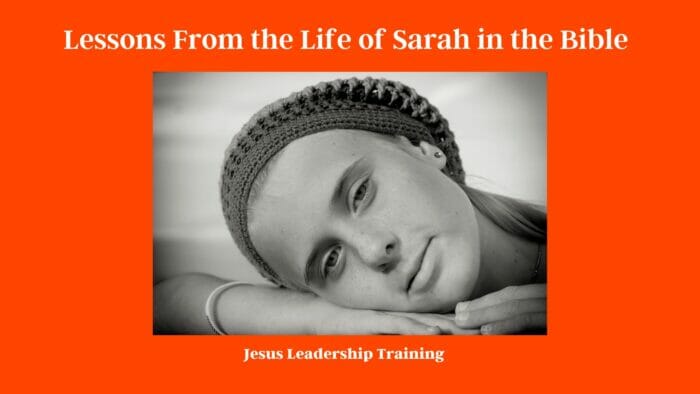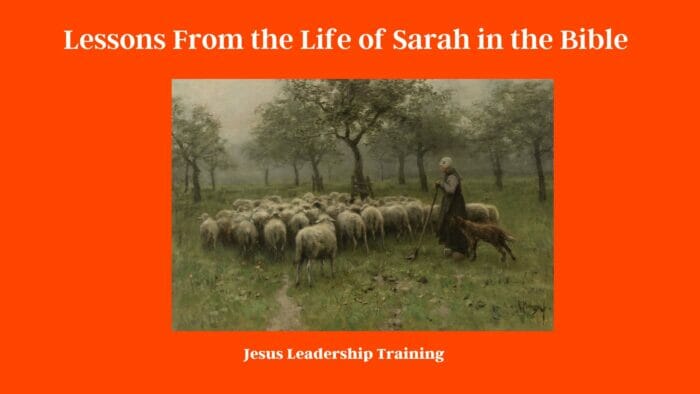Lessons From the Life of Sarah in the Bible – Dive deep into the wisdom of biblical narratives as we explore the pivotal “lessons from the life of Sarah in the Bible.” Her story reveals powerful truths about faith, grace, and the remarkable resilience of the human spirit.
Table of Contents
Lessons From the Life of Sarah in the Bible
What timeless wisdom can we glean from ancient scriptures? As we navigate the choppy waters of life, we often turn to religious texts in search of guidance, inspiration, and solace. Among these revered tomes, the Bible stands out with its compelling narratives and profound teachings. One of the most remarkable characters etched in its sacred pages is Sarah, a woman of faith, grace, and indomitable spirit.
Sarah, the wife of Abraham, is one of the most compelling figures in the Bible. Her life was marked by ups and downs, extraordinary faith, and human weaknesses—making her an incredibly relatable character. Let’s delve into some key lessons we can learn from her life. 📖✨
| Lesson | Example from Sarah’s Life | Insight for Our Lives |
|---|---|---|
| Faith and Doubt Can Coexist | Sarah laughed when told she would have a son in her old age (Genesis 18:12). | Even strong believers have moments of doubt or skepticism. It’s human to waver, but what counts is our willingness to keep believing. |
| God’s Promises Are Trustworthy | Despite her initial doubt, Sarah did eventually give birth to Isaac (Genesis 21:1-3). | God keeps His promises, even if it seems impossible from a human perspective. Trust in His timing. |
| Be Careful with Self-Reliance | Sarah tried to “help” God by having Hagar bear a child for Abraham (Genesis 16:1-2). | Trying to make God’s promises come true on our own terms often leads to complications and strife. |
| God Hears Our Pain | God heard Hagar’s cry, who was mistreated by Sarah (Genesis 16:7-11). | God is aware of the pain we inflict on others and calls us to make it right. |
| Be Open to Correction | Sarah had to accept God’s correction about her disbelief and her treatment of Hagar (Genesis 18:13-15; 21:9-12). | Humility and the ability to accept correction are vital for personal and spiritual growth. |
| Your Influence Is Powerful | Sarah was a leading matriarch whose influence shaped Israel’s history. | Never underestimate the long-term impact of your faith and actions, especially within your family or close community. |
| Expect Surprises from God | Sarah experienced joy and motherhood in her old age, against all odds (Genesis 21:6-7). | God often works in surprising and unexpected ways. Be open to miracles, big or small. |
I hope this table offers you valuable insights and lessons from the life of Sarah in the Bible. She is a testament to the complexities of faith, the faithfulness of God, and the growth that comes through life’s challenges. 🌟😊
As we delve into the lessons from the life of Sarah in the Bible, we uncover transformative truths that can help illuminate our journey. Let’s embark on this journey together, shall we?
15 Remarkable Women Bible Characters: Their Stories and Impact | Bible | Women
Faith is often described as a steadfast belief in something unseen, and Sarah’s unwavering trust in the promises of God exemplifies this definition. Throughout her life, Sarah demonstrated an extraordinary level of faith as she followed God’s plan, even when circumstances seemed impossible. Her story serves as a testament to the power of faith and its ability to shape one’s life.
From the moment God promised Sarah and her husband Abraham that they would have a child in their old age, Sarah clung to that promise with unwavering faith. Despite her initial doubts and skepticism, Sarah believed in God’s ability to fulfill His word. As the years passed and her barrenness persisted, Sarah’s faith was tested. Yet, she never wavered in her conviction that God would keep His promise. This deep-rooted faith sustained her through the darkest moments of her life, giving her hope when all seemed lost.

As Sarah’s life unfolded, the fulfillment of God’s promise became a reality. In her old age, Sarah miraculously conceived and gave birth to Isaac, the long-awaited child. The joy and gratitude Sarah felt upon holding her son were undoubtedly immeasurable. Her faith had been rewarded, and she saw firsthand the faithfulness of God. This pivotal event in her life further solidified Sarah’s trust in God’s promises, reinforcing her unwavering belief in His divine plan.
Sarah’s journey of faith serves as an inspiration for believers throughout generations. Her resolute trust in God’s promises, even in the face of seemingly insurmountable odds, is a powerful reminder of the rewards that faith can bring. Sarah’s story teaches us that when we wholeheartedly put our faith in God and His promises, we can experience His faithfulness and see His plans unfold in our lives. Sarah’s unwavering faith serves as a timeless example of the transformative power of trust in God’s promises, encouraging us to embrace a similar steadfastness in our own journeys of faith.
The Early Years of Sarah: A Testament (Story) to Faith and Resilience
Main Events in Sarah’s Life from the Bible (Life Lesson)
Here is a table summarizing the main events in Sarah’s life as narrated in the Bible:
| Event | Biblical Reference | Description |
|---|---|---|
| Marriage to Abram | Genesis 11:29 | Sarah (then Sarai) marries Abram (later renamed Abraham by God). They are half-siblings, sharing the same father. |
| Journey to Canaan | Genesis 12:1-5 | God calls Abram to leave his country and his father’s house and go to the land of Canaan. Sarai accompanies him on this journey. |
| Sojourn in Egypt | Genesis 12:10-20 | During a famine, Abram takes Sarai to Egypt. Fearful that the Egyptians will kill him to take Sarai (due to her beauty), Abram asks her to say she is his sister. The Pharaoh takes her into his palace, but when God afflicts him and his house with plagues, Sarai is returned to Abram, and they are sent away. |
| Sarah’s barrenness and Hagar | Genesis 16:1-16 | Since Sarai is barren, she gives her maidservant Hagar to Abram as a wife to bear a child for her. Hagar becomes pregnant and gives birth to Ishmael. Conflict arises between Sarai and Hagar due to this. |
| God’s Covenant and Renaming | Genesis 17:1-22 | God establishes a covenant with Abram (now Abraham) and promises him a son through Sarai. God changes Sarai’s name to Sarah (which means “princess” or “noblewoman”) and blesses her. |
| Birth of Isaac | Genesis 21:1-7 | God fulfills His promise, and Sarah miraculously gives birth to Isaac in her old age, bringing her great joy. |
| Conflict with Hagar and Ishmael | Genesis 21:8-21 | Sarah sees Ishmael mocking at Isaac’s weaning feast and insists that Abraham send Hagar and Ishmael away. God reassures Abraham and instructs him to listen to Sarah. |
| Death and Burial | Genesis 23:1-20 | Sarah dies at the age of 127 in Hebron. Abraham mourns for her and purchases a field with a cave from Ephron the Hittite as a burial site. Sarah is the first to be buried in the Cave of Machpelah, which becomes the family burial place. |
This table provides an overview of the key events in Sarah’s life as recorded in the Book of Genesis in the Bible. As the wife of Abraham and the mother of Isaac, her life played a crucial role in the narrative of the Abrahamic faiths.

Sarah’s Journey Begins ( Daily Devotional)
When we first meet Sarah, known then as Sarai, she is introduced as Abram’s wife. The couple was childless, a harsh reality that bears more significance considering the culture and time period. How did Sarah cope with this difficult situation?
Facing the Pain of Barrenness (God Plan)
Sarah’s barrenness was a source of deep sorrow for her. Yet, she remained hopeful, displaying an unwavering faith in God’s promises. In our lives, we may face similar periods of waiting and uncertainty. Sarah’s resilience in these moments teaches us the value of steadfast faith amidst adversity.
Sarah’s Test of Faith (Word)
In the narrative, God promises Abraham descendants as numerous as the stars. Despite her age, Sarah’s faith in God’s promise doesn’t waver. From her example, we learn that faith often involves holding onto divine promises, even when circumstances seem impossible.

Sarah’s Trials: Lessons in Human Frailty and Divine Grace
Making a Plan
Growing impatient with God’s timing, Sarah proposed that Abraham have a child through her maidservant, Hagar. From this episode, we understand the dangers of relying on our understanding instead of waiting for God’s plan to unfold.
Facing the Consequences
Sarah’s plan leads to tension and conflict in her household. Despite this, God remained faithful to His promise. Through her experience, we learn that even in our failures and mistakes, God’s grace remains.
| Event Description | Reference | Trial of Faith |
|---|---|---|
| God’s promise of a child | Genesis 17:15-21 | Sarah struggled to believe in God’s promise due to her old age and barrenness. This was a test of her faith in God’s power and promise. |
| Sarah offers her maid to Abraham | Genesis 16:1-6 | Sarah took matters into her own hands when God’s promise of a child seemed to be delayed. This showed her struggle to fully trust God’s timing. |
| Laughing at the promise of a son | Genesis 18:9-15 | When told she would bear a son in her old age, Sarah laughed. This was another instance of her doubting God’s promise, demonstrating the trial of faith in believing the impossible. |
| The birth of Isaac | Genesis 21:1-7 | When Sarah finally bore Isaac, she realized God’s promise. Her faith was rewarded, but not before being severely tested. |
| Expelling Hagar and Ishmael | Genesis 21:9-14 | Sarah made the difficult decision to send Hagar and Ishmael away to ensure Isaac’s inheritance. This showed her faith in God’s promise about Isaac, but it was a painful decision. |
| Abraham commanded to sacrifice Isaac | Genesis 22:1-19 | Though not directly involved, Sarah’s faith would have been tested by God’s command to Abraham to sacrifice their only son, only for God to provide a ram as a substitute. |
Sarah’s Redemption: A Testament to God’s Faithfulness
The Promise Fulfilled
Despite her shortcomings, God fulfills His promise to Sarah. At 90, she gives birth to Isaac, a testament to God’s faithfulness and a lesson to us all: God’s promises are not bound by human limitations. Christ Holy
Sarah’s Legacy
The birth of Isaac marked the beginning of a nation that would become as numerous as the stars. Sarah’s story culminates in her becoming the matriarch of this great nation. It reminds us that God can use anyone, regardless of their past, to fulfill His divine purpose.
Descendents of Abraham and Sarah
| Generation | Descendant |
|---|---|
| 1st | Isaac (Abraham and Sarah’s son) |
| 2nd | Esau (Isaac’s son with Rebekah) |
| Jacob (also known as Israel, Isaac’s son with Rebekah) | |
| 3rd | Reuben, Simeon, Levi, Judah, Dan, Naphtali, Gad, Asher, Issachar, Zebulun, Joseph, and Benjamin (Jacob’s sons with Leah, Rachel, Bilhah, and Zilpah) |
| 4th | Manasseh and Ephraim (Joseph’s sons) |
| The descendants of Jacob’s other sons eventually formed the Twelve Tribes of Israel |
Note: This is a simplified version of the family tree. For example, it does not include all of Abraham’s other descendants through his second wife Keturah and his concubine Hagar. Esau also had descendants, the Edomites, who are not included here.
- she also learned that god works through our weaknesses and sins
- valuable lessons on honoring and obeying god in our lives
- picks up when her husband received his call from god
Etymology of the Biblical Name Sarah
The name Sarah is a Biblical name with a rich and varied history. As one of the matriarchs of the Bible, Sarah has been a symbol of faith and strength for thousands of years. The etymology of Sarah is ancient and complex, with roots in multiple languages. In this blog, we will explore the origin of the name Sarah in Hebrew, Greek, and Aramaic.
Origin
The earliest known use of the name Sarah dates back to Ancient Egypt. During the time of the Pharaohs, it was a popular name among the royal families. The Egyptian version of the name, Sarai, is the origin of the modern name Sarah. Sarai also has an interesting etymological history, deriving from the Ancient Egyptian word for ‘princess’.
Hebrew
The Hebrew version of the name Sarah is שרה (pronounced ‘shah-rah’). This name is derived from the Hebrew root word שר (‘shar’), which means ‘princess’ or ‘noblewoman’. The name Sarah was given to the biblical matriarch Sara by God himself, and it is believed to be a reference to her noble status in the eyes of God.
Greek
The Greek version of the name Sarah is Σαρα (pronounced ‘sah-rah’). This name is derived from the Greek root word σαρας (‘saras’), which means ‘princess’ or ‘noblewoman’. This is similar to the Hebrew version of the name, and it is likely that the two forms have a common origin.
Aramaic
The Aramaic version of the name Sarah is שרא (pronounced ‘shah-rah’). This name is derived from the Aramaic root word שרא (‘shara’), which means ‘queen’ or ‘mistress’. This is the same root word as the Hebrew version, and it is likely that the two forms have a common origin.
Sarah is a name that has been used for thousands of years, and its etymology is complex and varied. Its roots can be traced back to Ancient Egypt, Hebrew, Greek, and Aramaic, and it is a name that has been associated with faith and strength throughout history.
Names that come from the Biblical name of Sarah
| Biblical Name | Derived Names | Language/Culture |
|---|---|---|
| Sarah | Sara | Spanish, Italian |
| Sarah | Sarai | Biblical Hebrew |
| Sarah | Sadie | English |
| Sarah | Sally | English |
| Sarah | Sari | Finnish |
| Sarah | Sára | Hungarian |
| Sarah | Sarra | Greek |
| Sarah | Sara | Scandinavian |
| Sarah | Sári | Hungarian |
| Sarah | Sera | Turkish |
Please note that while these names derive from the name “Sarah”, their meanings may not always align directly with the original Hebrew meaning of “Sarah,” which is “princess” or “noblewoman”.
FAQs
1. Who was Sarah in the Bible?
Sarah was the wife of Abraham and the mother of Isaac. She is recognized as a woman of faith and the matriarch of the Hebrew nation.
2. What can we learn from Sarah’s life in the Bible?
Sarah’s life offers numerous lessons on faith, patience, grace, resilience, and the faithfulness of God.
3. What was Sarah’s biggest mistake and what can we learn from it?
Sarah’s biggest mistake was trying to fulfill God’s promise through her understanding, which led to tension and conflict. We learn from this the importance of
patience and trusting in God’s timing.
4. How does Sarah’s life show God’s grace?
Despite Sarah’s mistakes, God remained faithful to His promise, displaying His unmerited favor and grace.
5. What does Sarah’s story teach about resilience?
Sarah’s story exemplifies resilience, especially in her struggle with barrenness and her unwavering faith in God’s promises.
6. How is Sarah’s story relevant today?
Sarah’s story is timeless, teaching us about faith, grace, and resilience. These lessons are as relevant today as they were thousands of years ago.
Best Bible Encyclopedias and Dictionaries
Below is a table featuring some highly regarded Bible Encyclopedias and Dictionaries along with their publishers and websites where they can be found or purchased.
| Title | Publisher | Website |
|---|---|---|
| The International Standard Bible Encyclopedia | Eerdmans | Eerdmans |
| Zondervan’s Pictorial Bible Dictionary | Zondervan | Zondervan |
| Easton’s Bible Dictionary | Thomas Nelson | Thomas Nelson |
| Holman Illustrated Bible Dictionary | B&H Publishing Group | B&H Publishing Group |
| The New Unger’s Bible Dictionary | Moody Publishers | Moody Publishers |
| HarperCollins Bible Dictionary | HarperOne | HarperOne |
| Vine’s Complete Expository Dictionary of Old and New Testament Words | Thomas Nelson | Thomas Nelson |
You can generally find these resources on the publishers’ websites, as well as other online book retailers such as Amazon or Christianbook. It’s always good practice to confirm availability and review additional details on the specific websites or other reliable online bookstores.
Final Thoughts – Lessons From the Life of Sarah in the Bible
Delving into the lessons from the life of Sarah in the Bible, we unearth timeless truths and transformative insights. Sarah’s story is one of faith, human frailty, divine grace, and the faithfulness of God’s promises. Her resilience in the face of trials, her errors along the journey, and God’s grace that upheld her, all converge to shape a narrative that remains profoundly relevant for us today.
In our own journeys, may we find comfort, guidance, and inspiration in the life of Sarah. As we grapple with our frailties and strive to live with faith, may we too experience the transformative power of divine grace and the fulfillment of God’s promises.





